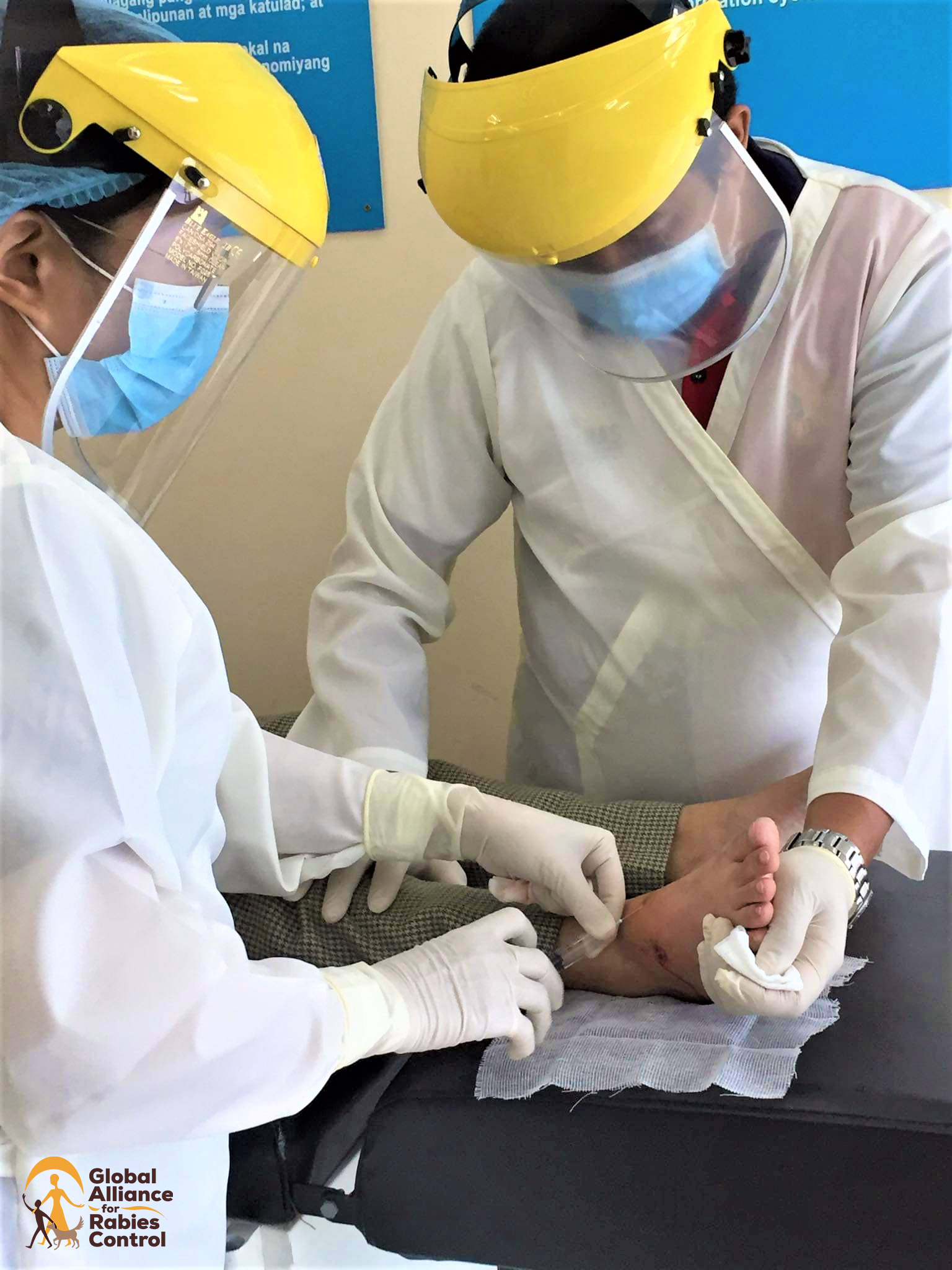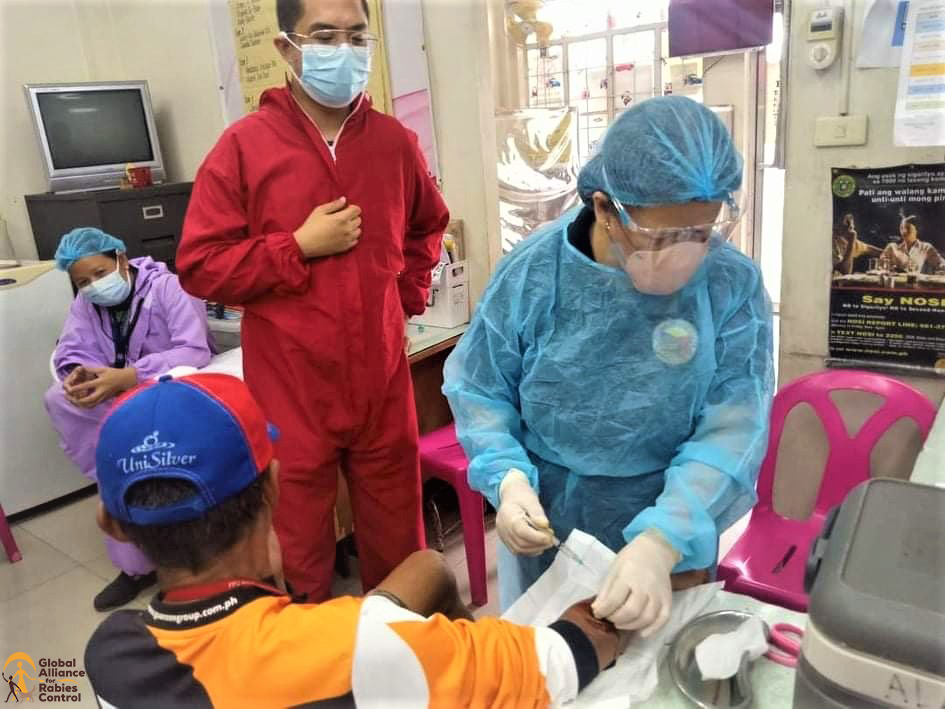Protecting our frontline rabies saviors in the Philippines from COVID-19
In an instant, the world seemed to stop due to the COVID-19 pandemic. No mass public transportation, no mass gatherings, and entire communities are placed on lockdown except for essential services.
In the Philippines, Metro Manila is the epicenter of the COVID-19 pandemic. The 17 municipalities and cities that comprise Metro Manila include Muntinlupa City where the Community Based Rabies Surveillance project – a GARC initiative – is being implemented. Trainings for village health workers were postponed as well as the community- and school-based education interventions. Rabies surveillance undertaken by community health workers was limited as their focus shifted to COVID-19 response. Unfortunately, in April 2020, to limit the spread of COVID-19, all community-based interventions such as mass vaccination campaigns, active case findings and population-based surveys were postponed. That means that many of the rabies elimination efforts ground to a halt, putting thousands of lives at risk for rabies once again.
The recommendations for community interventions were later revised to allow Neglected Tropical Disease (NTD) control activities – including rabies – to recommence based on a risk assessment, ensuring the safety of health care workers and the community in implementing their interventions. With this change in recommendations, the Philippines community-based teams got straight back into fighting rabies and working towards elimination. As for the City Government of Muntinlupa, rabies vaccination for dogs and post-exposure prophylaxis for bite victims are considered as essential services and these activities never stopped – but essential Personal Protective Equipment (PPE) and strict recommendations were enforced from the start.
“Rabies is an ongoing problem. We don’t, and must not, stop exerting our important efforts for the rabies program, pandemic or no pandemic.” - Dr. Jimel Christopher Orprecio, Rabies Program Coordinator (OCV)
To continue their life-saving efforts against rabies, while remaining safe from COVID-19, the patients and staff at the bite treatment centers needed to follow strict safety protocols. For the 5 (five) animal bite treatment centers (ABTCs) that remained operational even during the strict lockdown, safety protocols have been strictly implemented. Social distancing, the mandatory wearing of masks, and temperature checks are strictly enforced for every patient. Healthcare workers are mandated to wear personal protective equipment (PPE suit, face mask, gloves, and face shield). Plastic barriers between the patient and the healthcare worker have been erected to ensure everyone’s safety during the rabies risk-assessment interview. Vaccination is also conducted in an open space such as in a tent outside the health center to enable social distancing between patients. All this was put in place to ensure that the lives of those at-risk for rabies could be saved, without compromising their safety and their community’s safety in terms of COVID-19.
“It is very important to continue these activities for rabies control and prevention and to prevent human death due to rabies”- Dr. Mariza Pelisco, Muntinlupa, Rabies Program Coordinator (CHO)
The GARC team understood that the personnel saving lives from rabies needed to be kept safe from COVID-19 before they could continue their work. To ensure that people continued to receive rabies post-exposure prophylaxis, that dogs continued to be vaccinated, and that case investigations continued, GARC donated PPE for health care workers and city veterinarians. In total, 1,000 face masks, 150 face shields and 10 gallons of disinfectant were donated to the City Health Office and City Veterinary Office in Muntinlupa City.
While the pandemic is still ongoing, the threat of rabies continues.
“This pandemic may lead to increased number of cases due to more people staying in their homes, especially children who are still not in school or are attending online schooling. They have more time with their pet dogs and cats that may increase bite incidents” - Dr. Mariza Pelisco
GARC understands that the people on the ground – the rabies saviors – need to be protected to ensure that they can continue their life-saving work towards eliminating rabies. Please support our fundraising campaign to donate more PPE to the Philippines teams so that they can continue to save lives from rabies and keep themselves and their families safe from COVID-19.
Just USD 4 can buy 50 face masks. Click here to support our fundraiser, because you can help keep these rabies saviors safe while they save others from a 99% fatal disease – rabies.
Article contributed by: Dr. Sarah Jayme (GARC) in collaboration with Dr. Mariza Pelisco (CHO, Muntinlupa City, Philippines) and Dr. Jimel Christopher Orprecio (OCV, Muntinlupa City, Philippines)
The CBRS project is a collaboration between GARC, City Government of Muntinlupa and Research Institute for Tropical Medicine of the Department of Health with financial support from Botnar Foundation and Probitas Foundation.

